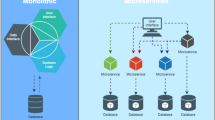Abstract
The availability of low cost microcomputers and the evolution of computer networks have increased the development of distributed systems. In order to get a better process allocation on distributed environments, several load balancing algorithms have been proposed. Generally, these algorithms consider as the information policy’s load index the length of the CPU’s process waiting queue. This paper modifies the Server-Initiated Lowest algorithm by using a load index based on the resource occupation. Using this load index the Server-Initiated Lowest algorithm is compared to the Stable symmetrically initiated, which nowadays is defined as the best choice. The comparisons are made by using simulations. The simulations showed that the modified Server-Initiated Lowest algorithm had better results than the Symmetrically Initiated one.
Similar content being viewed by others
References
P. Krueger and M. Livny. The diverse objectives of distributed scheduling policies. In: Seventh Int’l Conf. Distributed Computing Systems, IEEE CS Press, Los Alamitos, California. Proceedings... Order (microfiche only), No. 801 (1987), pp. 242–249.
N. G. Shivaratri, P. Krueger, and M. Singhal. Load distributing for locally distributed systems. IEEE Computer, (December 1992) 33–44.
P. K. Sinha. Distributed Operating Systems: Concepts and Design. John Wiley & Sons (1997).
S. Zhou and D. Ferrari. An experimental study of load balancing performance. Report N.o UCB/CSD 87/336, Progres Report N.o 86.8, Computer Science Division (EECS), University of California, Berkeley, California 94720 (January 1987).
M. M. Theimer and K. A. Lantz. Finding idle machines in a workstation-based distributed system. IEEE Transactions on Software Engineering, 15(11) (November 1989) 1444–1458.
C. Hui and S. T. Chanson. Hydrodynamic load balancing. IEEE Transactions on Parallel and Distributed Systems, 10(11) (November 1999) 1118–1137.
M. Mitzenmacher. How useful is old information? IEEE Transactions on Parallel and Distributed Systems, 11(1) (January 2000) 6–20.
J. R. Anderson and S. Abraham. Performance-based constraints for multidimensional networks. IEEE Transactions on Parallel and Distributed Systems, 11(1) (January 2000) 21–35.
Y. Amir, et al. An opportunity cost approach for job assignment in a scalable computing cluster. IEEE Transactions on Parallel and Distributed Systems, 11(7) (July 2000) 760–768.
A. E. Kostin, I. Aybay, and G. Oz. A randomized contention-based load-balancing protocol for a distributed multiserver queuing system. IEEE Transactions on Parallel and Distributed Systems, 11(12) (December 2000) 1252–1273.
S. M. Figueira and F. Berman. A slowdown model for applications executing on time-shared clusters of workstations. IEEE Transactions on Parallel and Distributed Systems, 12(6) (June 2001) 653–670.
A. Y. Zomaya and Y. Teh. Observations on using genetic algorithms for dynamic load-balancing. IEEE Transactions on Parallel and Distributed Systems, 12(9) (Setember 2001) 899–911.
Y. Zhang. Impact of workload and system parameters on next generation cluster scheduling mechanisms. IEEE Transactions on Parallel and Distributed Systems, 12(9) (Setember 2001) 967–985.
M. Mitzenmacher. The power of two choices in randomized load balancing. IEEE Transactions on Parallel and Distributed Systems, 12(10) (October 2001) 1094–1104.
C. M. Woodside and G. G. Monforton. Fast allocation of processes in distributed and parallel systems. IEEE Transactions on Parallel and Distributed Systems, 4(2) (February 1993) 164–174.
I. Page, T. Jacob, and E. Chern. Fast algorithms for distributed resource allocation. IEEE Transactions on Parallel and Distributed Systems, 4(2) (February 1993) 188–197.
T. Hsu, et al. Task allocation on a network of processors. IEEE Transactions on Computers, 49(12) (2000) 1339–1353.
Additional information
Rodrigo Fernandes de Mello (29) is a professor of The Institute of Mathematical Sciences and Computer at University of São Paulo, São Carlos, Brazil. He had his doctor degree from University of São Paulo, São Carlos in 2003. Since 1998 he has been researching in distributed systems, real time kernels and Internet.
Luis Carlos Trevelin (47) is a professor of The Computer Science Department at Federal University of São Carlos, Brazil, and coordinates its graduate program. He had his doctor degree from the Pontificea Catholic University of Rio de Janeiro in 1991 an did a post-doctor year at the UNIKENT Computing Lab. at Canterbury, England in 1993/94. His interest areas are Computing networks and distributed systems, computer systems performance modelling and high performance computing.
Maria Stela Veludo de Paiva received the M.S. and Ph.D. from the University of São Paulo, São Carlos, Brazil in 1986 and 1990 respectively. Since 1981 she is lecturer in the Electrical Engineering Department, at the São Carlos Engineering School, at theUniversity of São Paulo, Brazil. Her research acivities include parallel processing and hardware and software for Computer Vision.
Laurence Tianruo Yang is a professor at University of St. Francis Xavier, Canada. His research is mainly on high performance scientific and engineering computations with applications, design and test of embedded systems, wireless and mobile computing, pervasive computing and communications.
Rights and permissions
About this article
Cite this article
Mello, R.F.d., Trevelin, L.C., Paiva, M.S.V.d. et al. Comparative study of the server-initiated lowest algorithm using a load balancing index based on the process behavior for heterogeneous environment. Cluster Comput 9, 313–319 (2006). https://doi.org/10.1007/s10586-006-9743-6
Received:
Revised:
Accepted:
Issue Date:
DOI: https://doi.org/10.1007/s10586-006-9743-6




